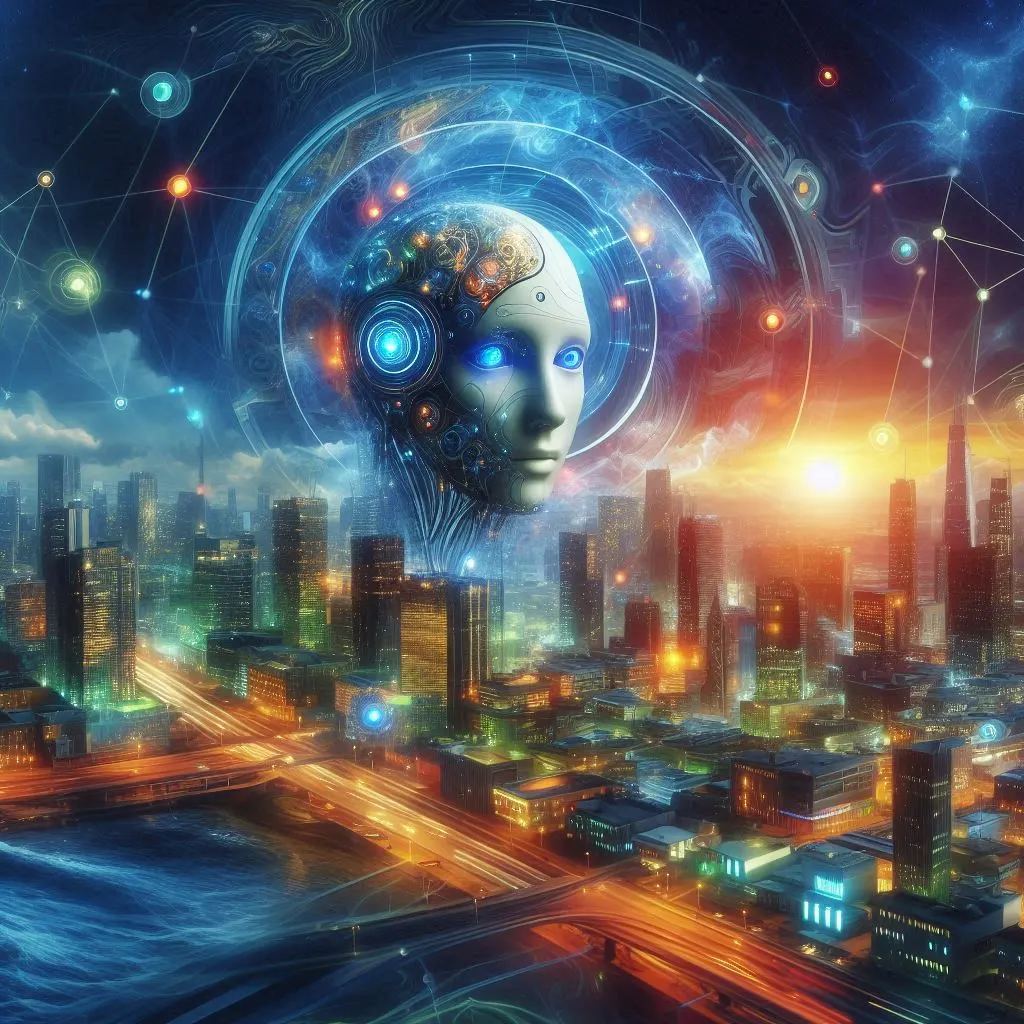
The Main Goal of Generative AI : Augmenting Human Creativity
Imagine machines that don’t just assist but create art, music, and stories as good as humans. This is the power of Generative AI. With the AI market growing 40% each year and set to reach $126.5 billion by 2030, this technology is changing industries fast. Understanding its goals and effects is key as it reshapes our world.

What Is Generative AI?
Generative AI creates new content like text, images, and music. It learns from large data sets and produces original works. As a result, it impacts many fields today.
Why Is It Important?
Generative AI helps solve problems quickly. Moreover, it enhances creativity and automates routine tasks. Therefore, it becomes a valuable tool for many industries.
Primary Goal of Generative AI
How AI Boosts Human Creativity
Enhancing Idea Generation
Generative AI gives new ideas to people. For example, it suggests creative solutions to artists and writers. Thus, it sparks their creativity.
Creating Original Content
AI produces artwork, music, and stories. Meanwhile, it frees people from repetitive tasks. Consequently, humans can focus on strategic work.
How AI Creates Realistic Content
Generating Lifelike Images and Videos
AI creates realistic images and videos. Specifically, it helps in marketing and entertainment by producing lifelike visuals. Therefore, it captures audience attention effectively.
Building Virtual Avatars and Spaces
Generative AI designs digital avatars and environments. As a result, users experience lifelike virtual worlds in gaming and VR. This, in turn, enhances their experience.
How Generative AI Automates Content Production
Automating Writing and Media Creation
AI writes articles and creates media content. Thus, it speeds up production and maintains high quality. Consequently, businesses can produce content faster.
Enhancing Productivity and Quality
AI automates routine tasks and boosts productivity. Moreover, it ensures consistent quality. As a result, businesses deliver better content.
How AI Personalizes User Experiences
Tailoring Content to Users’ Needs
AI analyzes user data and creates personalized recommendations. Thus, content becomes more relevant. Therefore, user satisfaction increases.
Improving User Engagement
Tailored content engages users more. As a result, engagement grows, and customer loyalty strengthens. Thus, businesses benefit from improved interactions.
How Generative AI Enhances Innovation
Simulating Scenarios
AI runs simulations to test ideas. For instance, it offers better solutions by analyzing different scenarios. Therefore, it aids decision-making.
Solving Complex Problems
AI helps solve difficult problems. Specifically, it provides solutions in science and engineering. Thus, it enhances problem-solving abilities.
Technological Foundations
Neural Networks and Deep Learning
Learning from Data
Generative AI uses deep learning to study data. Consequently, it finds patterns and produces meaningful content. Therefore, it gets better over time.
Continuous Improvement
AI learns and improves from data. In turn, it becomes more accurate. Thus, its outputs become more sophisticated.
Training AI Models
Data Collection and Preparation
AI needs clean, well-organized data. Therefore, proper data ensures effective learning. Otherwise, AI might produce flawed results.
Fine-Tuning Models
AI models require fine-tuning after training. Thus, fine-tuning optimizes their performance. As a result, AI provides reliable results.
Real-World Applications
Generative AI in Creative Industries
AI-Generated Art and Music
AI creates original art and music. For example, it assists artists and musicians. Thus, it expands their creative possibilities.
AI-Driven Design and Animation
AI develops new designs and animations. Therefore, it helps designers stay ahead. In turn, it accelerates creative processes.
AI in Business and Marketing Strategies
Personalized Marketing Campaigns
AI creates personalized ads and recommendations. Thus, it boosts engagement. As a result, conversion rates increase.
Automating Social Media Posts
AI automates social media content. This, in turn, saves time and ensures consistency. Therefore, businesses stay active online.
Healthcare Applications of Generative AI
AI-Generated Medical Images
Generative artificial intelligence produces medical images for diagnoses. Moreover, it detects details humans might miss. Thus, it improves diagnostic accuracy.
Drug Discovery and Development
AI analyzes data for drug discovery. As a result, it speeds up treatment development. Therefore, it can save lives.
Scientific Research Using Generative AI
Simulating Experiments
AI runs simulations to test ideas. Thus, it saves time and resources. As a result, researchers explore possibilities faster.
Accelerating Discoveries
Generative artificial intelligence (AI) analyzes data to find patterns quickly. Therefore, scientists make discoveries faster. Thus, research advances in various fields.
Potential Limitations and Challenges
Data Privacy and Security
Protecting Personal Data
AI requires data, raising privacy concerns. Thus, companies must protect personal information. Therefore, proper measures prevent breaches.
Managing Intellectual Property
Ownership of AI-generated content raises legal questions. Thus, new laws are needed to protect intellectual property rights.
Addressing Ethical Concerns
AI Bias and Fairness
Generative AI might reflect biases from data. Therefore, developers must ensure fairness. Thus, AI should avoid reinforcing discrimination.
Preventing Misuse of AI
AI can be used to create harmful content. Therefore, rules are needed to prevent misuse. In addition, ethical guidelines must be followed.
Ethical and Social Implications
Impact on Jobs
Automating Tasks
AI automates certain jobs. However, it creates new opportunities. Thus, it reshapes the job market.
Reshaping Industries
AI changes how work is done. As a result, businesses must adapt. Thus, AI drives new industry practices.
AI and Social Responsibility
Ensuring Fair AI Practices
Companies must use AI ethically. In addition, they should promote fairness and transparency. Therefore, societal trust grows.
Addressing Social Inequalities
Access to AI can widen social gaps. Therefore, policymakers must ensure equal access. Thus, AI’s benefits are shared more fairly.
Future Prospects
Expanding AI Capabilities
AI in Everyday Life
Generative AI will play a bigger role in daily activities. For instance, it will assist in tasks and transform how we interact with technology.
AI in Scientific and Industrial Growth
AI drives growth in industries and research. For example, it helps solve major global issues. Therefore, it enhances scientific and industrial progress.
Generative AI Overcoming Challenges
Regulating AI
Governments need to regulate AI use. Thus, they ensure ethical practices while fostering innovation.
Ensuring Global Cooperation
Global cooperation is essential for AI’s development. Therefore, nations must work together to maximize AI’s benefits.
Generative AI is changing industries by boosting creativity, automating tasks, and personalizing experiences. It creates original content like art, music, and stories, which impacts areas from entertainment to healthcare. As AI advances, its influence will grow, and industries will need to adapt.
Understanding the goals of generative AI, such as enhancing creativity and solving complex problems, is essential. This technology will drive progress in business, science, and society. It improves workflows and helps people make better decisions.
While AI develops, it must also face challenges like data privacy, bias, and ethical use. If companies use AI responsibly and work together, generative AI will open new possibilities and shape the future of work and creativity.
FAQs:
Who is the Father of Generative AI?
While there isn’t one single “father” of Generative AI, Geoffrey Hinton is often considered a key figure and pioneer in the field, particularly for his foundational work on neural networks and deep learning, which are core to how generative AI works today.
Here’s why Hinton is so important:
Backpropagation: Hinton was instrumental in developing the backpropagation algorithm, which is a crucial technique for training neural networks. This algorithm allows the network to learn from its mistakes and improve its performance over time.
Boltzmann Machines: He also made significant contributions to the development of Boltzmann machines, a type of neural network that can learn complex probability distributions, which is essential for generative modeling.
Deep Learning: Hinton’s work on deep learning, particularly with deep belief networks, laid the groundwork for many of the generative AI models we see today.
It’s important to note that many other researchers have contributed to the field of generative AI, including:
Ian Goodfellow: Known for his work on Generative Adversarial Networks (GANs), a powerful type of generative model.
Jürgen Schmidhuber: Made significant contributions to recurrent neural networks (RNNs) and Long Short-Term Memory (LSTM) networks, which are used in many generative models for sequential data like text and music.
However, Hinton’s work on neural networks and deep learning is widely recognized as foundational to the development of modern generative AI, which is why he is often referred to as one of the “Godfathers of AI” and a key figure in the rise of generative models.
What Jobs Will Generative AI Replace?
Generative AI will likely impact jobs involving repetitive, rule-based tasks with readily available data, such as some content creation (writing, basic graphic design), entry-level programming, routine customer service, and data entry. However, it’s more about task displacement and augmentation than complete job replacement, with new AI-related jobs also emerging.
What Makes Generative ai unique
Modern AI stands out because it can create entirely new content. Unlike traditional AI, which focuses on analyzing, predicting, or sorting existing information, generative AI makes new data that resembles what it has been trained on.
Here’s what makes it unique:
Ability to Create New Things (Generative Capacity): This is the key difference. Generative AI doesn’t just spot patterns; it learns the underlying structure and patterns in data to produce brand-new outputs. It can create text, images, audio, code, and other kinds of data that didn’t exist before.
Understanding How Data Relates (Learning Complex Distributions): Generative models learn the probability distribution of the data they are trained on. This means they grasp the connections between different pieces of data and can create examples (samples) that fit within that pattern (distribution). This allows them to generate outputs that are realistic and make sense.
Different Ways of Doing It (Variety of Models): Generative AI uses several different techniques, including: Generative Adversarial Networks (GANs): These use two neural networks—a “generator” that makes new data and a “discriminator” that tries to tell the difference between real and fake data—that work against each other to produce increasingly realistic results.
Variational Autoencoders (VAEs): These models learn a compressed version of the data and then use that compressed version to create new examples.
Diffusion Models: These models learn to undo a process of gradually adding random noise to data. By reversing this process, they can generate high-quality samples.
Large Language Models (LLMs): These models are trained on huge amounts of text and can generate human-like text, translate languages, write different kinds of creative content, and answer your questions in an informative way.
This ability to create original content makes generative AI a powerful tool with the potential to transform many industries and aspects of our lives.
Will Generative AI Replace Humans?
GEN AI won’t fully replace humans. It’ll automate specific tasks within jobs, changing how we work and creating new roles, but human skills like critical thinking and emotional intelligence will remain crucial.
What Technology can Replace Generative AI?
It’s not about replacement, but evolution. Neuro-symbolic AI (combining neural networks with logic), causal AI (understanding cause and effect), quantum computing (more powerful algorithms), and embodied AI (AI in robots interacting with the real world) could complement or shift the focus from current generative AI methods.
What is the Goal of AI?
The goal of AI is to replicate human intelligence in machines. This ranges from the ambitious pursuit of human-level “general” intelligence to the more practical development of “narrow” AI designed for specific tasks like automation and problem-solving.








